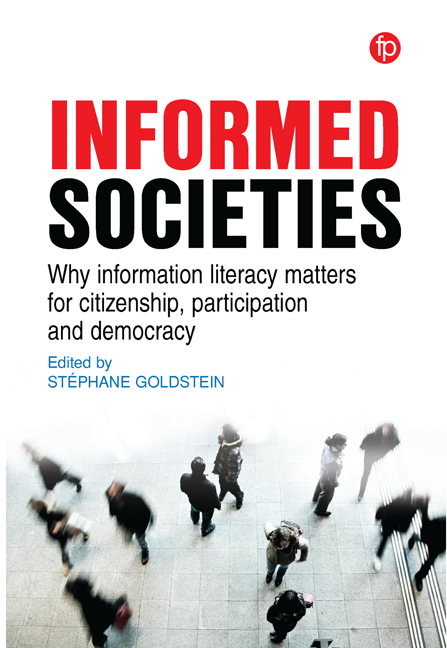Book contents
- Frontmatter
- Contents
- Figures and Tables
- Notes on the authors
- Foreword
- Introduction
- 1 Information Literacy in the Digital Age: Why Critical Digital Literacy Matters for Democracy
- 2 The Discourses of Power, Information and Literacy
- 3 What Intellectual Empathy Can Offer Information Literacy Education
- 4 The ‘Post-Truth’ World, Misinformation, and Information Literacy: a Perspective From Cognitive Science
- 5 Media and Information Literacy: Intersection and Evolution, a Brief History
- 6 Information Literacy and National Policy Making
- 7 Information Literacy as a Growth Pillar for a Fledgling Democracy
- 8 Information literacy and the Societal Imperative of Information Discernment
- 9 Libraries and Democracy: Complementarity in a Regime of Truth
- 10 Scottish Public Libraries Welcome Syrian New Scots: a Transition from Being a Refugee to Becoming an Active Part of the Community
- 11 Information Literacy, Lifelong Learning and the Needs of an Ageing Population
- Index
5 - Media and Information Literacy: Intersection and Evolution, a Brief History
Published online by Cambridge University Press: 22 February 2020
- Frontmatter
- Contents
- Figures and Tables
- Notes on the authors
- Foreword
- Introduction
- 1 Information Literacy in the Digital Age: Why Critical Digital Literacy Matters for Democracy
- 2 The Discourses of Power, Information and Literacy
- 3 What Intellectual Empathy Can Offer Information Literacy Education
- 4 The ‘Post-Truth’ World, Misinformation, and Information Literacy: a Perspective From Cognitive Science
- 5 Media and Information Literacy: Intersection and Evolution, a Brief History
- 6 Information Literacy and National Policy Making
- 7 Information Literacy as a Growth Pillar for a Fledgling Democracy
- 8 Information literacy and the Societal Imperative of Information Discernment
- 9 Libraries and Democracy: Complementarity in a Regime of Truth
- 10 Scottish Public Libraries Welcome Syrian New Scots: a Transition from Being a Refugee to Becoming an Active Part of the Community
- 11 Information Literacy, Lifelong Learning and the Needs of an Ageing Population
- Index
Summary
Introduction
This chapter discusses the evolution of the media and information literacy (MIL) concept, and the framework for understanding the ‘intersection’ between media literacy (ML) and information literacy (IL). The aim is to offer a brief history and a general introduction to MIL and the work and actions deployed by UNESCO. The chapter is useful to those who are interested in becoming familiar with this subject. This is a bibliographic and exploratory text, not an indepth study.
Concept evolution: media and information literacy – the historical place of IL and ML
UNESCO created the MIL concept in 2007 by merging two separate terms, stating that MIL ‘… empowers citizens to understand the functions of media and other information providers, to critically evaluate their content, and to make informed decisions as users and producers of information and media content.’ (UNESCO, 2017c; see also Grizzle, 2013). The organisation prefers not to give a classic definition of MIL, focusing instead on delineating the key learning objectives, outcomes or competencies of MIL. The argument here is that it is hard to capture all the essentials of MIL in one short paragraph. Furthermore, when one considers the hundreds of definitions of media literacy and information literacy, with their myriad of entry points and emphases, non-expert stakeholders may be confused (Grizzle, 2013 and Grizzle, 2014a). MIL skills are elements vital to the exercising of human rights, as established by Article 1 of the Universal Declaration of Human Rights, ‘all human beings are born free and equal in dignity and rights …’ (United Nations, 2006). It is a right that is also recognised in the UN Sustainable Development Goals that have a human rights approach, where public information access and other fundamental freedoms are included specifically in target 16.10 (United Nations, 2015). UNESCO has made several great efforts to promote MIL skills as vital elements in the exercise of human rights are several but best summarised in the book Media and Information Literacy: enhancing human rights and countering radicalization and extremism (Grizzle, 2016). MIL skills and their role in democracy, participation and social, economic and political engagement, as well as in personal well-being, have also been a concern for UNESCO.
- Type
- Chapter
- Information
- Informed SocietiesWhy information literacy matters for citizenship, participation and democracy, pp. 89 - 110Publisher: FacetPrint publication year: 2019
- 3
- Cited by



